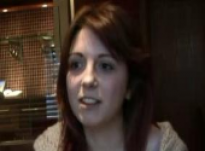Rebekah

More about me...
At 13, Rebekah tried different diets as she felt everyone around her was dieting. Soon she was restricting, bingeing and purging. Rebekah got involved with pro-Anorexia sites and food soon became an obsession.
At 13, Rebekah tried different diets as she felt everyone around her was dieting. Soon she was restricting, bingeing and purging. Rebekah got involved with pro-Anorexia sites and food soon became an obsession.
Rebekah goes to an 'outstanding' self-help group. She doesn't have much family support and says that without support people can become isolated.
Rebekah goes to an 'outstanding' self-help group. She doesn't have much family support and says that without support people can become isolated.
But at the moment I’m involved in a self-help group for eating disorders and it is, it’s fabulous, it’s excellent. The support that I get from them is just, it’s outstanding, and I find it, you know ‘cos I don’t get support at home, like my home life is pretty rubbish, and so getting the support off them daily, it’s just great because you know, you know where you are with them, and that it’s really like informal so, and they’ll tell you like if, you know, if I’m having a really rubbish day I can just say that I’m having a rubbish day and they’re there, send me a text, give me a call. And I’ve made really amazing good friends in the group, and they’re just great. And I think, and especially after you’ve come out from hospital, you, I think you always need that sort of like back up seeing the consultant, seeing like the help, the therapist etcetera, because you can’t just be set, just be gone back into the, step back, not step back, but step out into the world again without any help, because I think you can become quite isolated again and you know you need the support.
Rebekah said it was easy for a 13-year-old to get involved in Pro-Ana sites. What started as a supportive environment ended up being competitive and triggering and she had to leave.
Rebekah said it was easy for a 13-year-old to get involved in Pro-Ana sites. What started as a supportive environment ended up being competitive and triggering and she had to leave.
When Rebekah was ill with anorexia nervosa there was much more help available than when she tried to find help with bulimia nervosa.
When Rebekah was ill with anorexia nervosa there was much more help available than when she tried to find help with bulimia nervosa.
Rebekah worked on her body-image in workshops and by building her self-confidence. Restoring a healthy weight can help you feel 'great about yourself'.
Rebekah worked on her body-image in workshops and by building her self-confidence. Restoring a healthy weight can help you feel 'great about yourself'.
Even now it’s hard, like look in the mirror because I find it really difficult but I’ve worked on that with like my whole body-image and workshops so I guess and I think, like that was in , when I was in hospital they do, they have like body-image workshops, creative and self-esteem and mindfulness. And I think it was really great, especially when you’re just, like your weight’s restoring and it’s getting to that healthy weight, and you’re feeling like really great about yourself.


